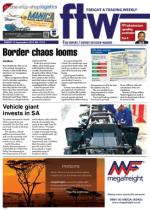A new concept in offshore
ports could offer significant
benefits to the shipping
industry in Africa, in the view
of Marco Pluijm, ports sector
manager of the US-based global
engineering, construction and
project management company,
Bechtel.
“As container vessels get
increasingly larger, leading to
cascading of ships and further
consolidation of shipping
routes, existing ports are under
pressure to efficiently handle
larger ships,” he said. “Offshore
ports can provide these
solutions, and can also serve as
hubs for existing ports.
“They can handle higher
quantities of containers and
bulk goods, and achieve
substantial savings in both
operational and capital costs
– in the region of 40-60% in
Africa.”
Pluijm is adamant that there
is a need for offshore ports in
Africa.
When it comes to the choice
between adjusting existing
ports or creating one or more
hubs, the multi-user offshore
hub (MUOH) is a viable
solution, he said.
The MUOH concept, he
added, originates from the
mining industry.
“It is an offshore facility at
adequate water depth, where
no dredging is required, and is
able to handle Cape Sizers and
the even bigger Valemax.
“Fed by barging – of 10 000
to 50 000 deadweight tonnes
(DWT) – it provides an uptime
of 90% minimum.
“And, where it’s possible,
a combination with river
transport provides significant
additional advantages over rail
or road.
One particular business case
analysed by Bechtel related
to possible MUOH savings in
Mozambique, where a capacity
of five to 40 million tonnes per
year to meet the mines’ output
was required.
The investment costs
compared in this study were
an inland port, a coastal port,
and an MUOH; rail track and
facilities, locos, wagons, etc.;
and the purchase of barges, to
minimise the cost of up-front
infrastructure investment
needs.
The operational costs
included the shipping charter
rates and fuel consumption
for Panamax, Cape Size and
Valemax; the maintenance of
rolling stock, barges, etc.; and
the maintenance dredging of
the river and coastal port.
And the outcome for the
MUOH, according to Pluijm,
was a substantial reduction in
Capex of 37-45 %, and in Opex
of 28-58%. This compared to
the base case, which was by
rail to the coastal port and by
Panamax vessels for the route
to China.
And an independent second
opinion from the consulting
engineers, Moffatt & Nichol,
came up with overall results
about the same or even better in
terms of cost reductions.
A second area in Africa
has also come under Bechtel’s
microscope – the Simandou
iron ore mining project in
Guinea, where the plan is for
initial iron ore exports of 50m
tonnes per annum (mtpa),
ramping up to 100 mtpa and
even more.
The current plan, according
to Pluijm, is for a river port,
suitable for Cape Size vessels up
to 250 000 DWT.
But this, he said, would
require dredging of the river
and a 35 kilometre offshore
channel, with anticipated
maintenance dredging of 20 to
50 million cubic metres a year.
“It’s a perfect spot for an
offshore port,” Pluijm added,
“fed by 30 000 to 45 000
DWT barges, serving Cape Size
vessels and even bigger when
required".
“With one or more
MUOHs in place in Africa,
the feasibility of mining and
all kinds of infrastructure
projects comes within reach,
boosting economic growth and
prosperity for those regions.”
But mining apart, Pluijm
reckoned that the MUOH
is also an ideal option for
containers.
He pointed to an ongoing
consolidation of shipping
routes; the economy of scale
key (number of TEUs, slow
steaming, fuel consumption,
emissions, etc.); the Triple
EEE being the current largest
container vessel, but even
bigger ones now on the drawing
board; and the cascading down
of previous generation vessels.
“Consequently,” he said,
“all major container ports are
(potentially) facing bigger size
containerships. These ports
and their facilities need to be
adjusted accordingly (water
depth, crane reach and the like).
“But an alternative is an
adequate offshore handling
facility (port), in combination
with short sea shipping and
feedering.”
Pluijm’s conclusions were
that there was a sharp increase
in demand for deep water
ports, driven by economy of
scale in the container industry
and bulk shipping.
CAPTION
There is a plan to build a river port in Guinea which is suitable for Cape Size vessels of up to
250 000 DWT. Photo: Wikimedia

